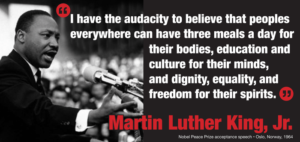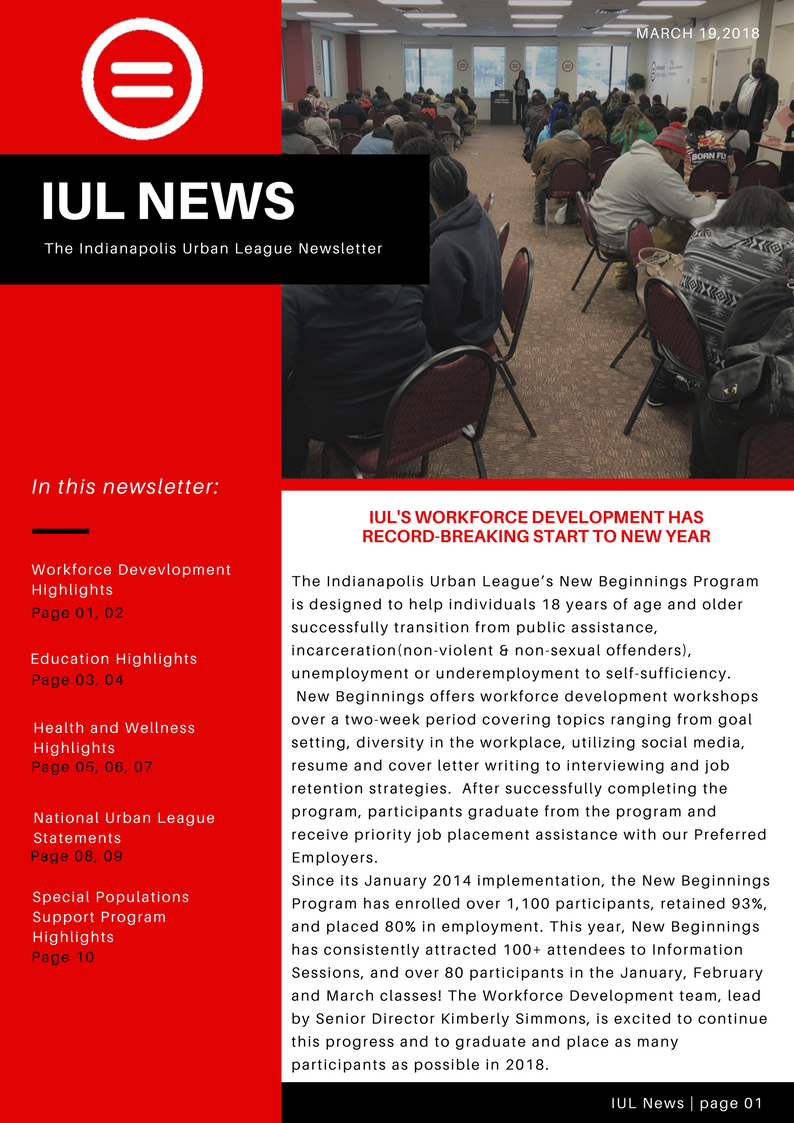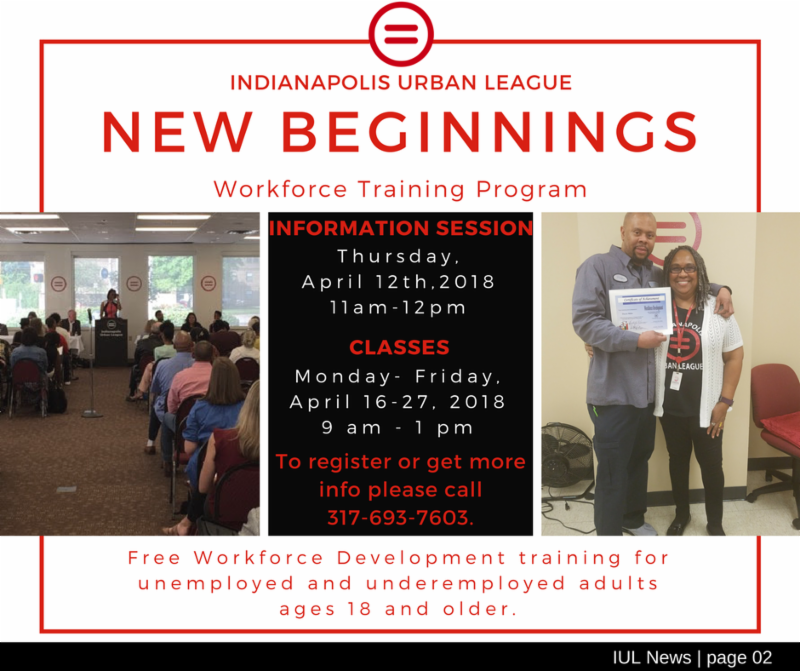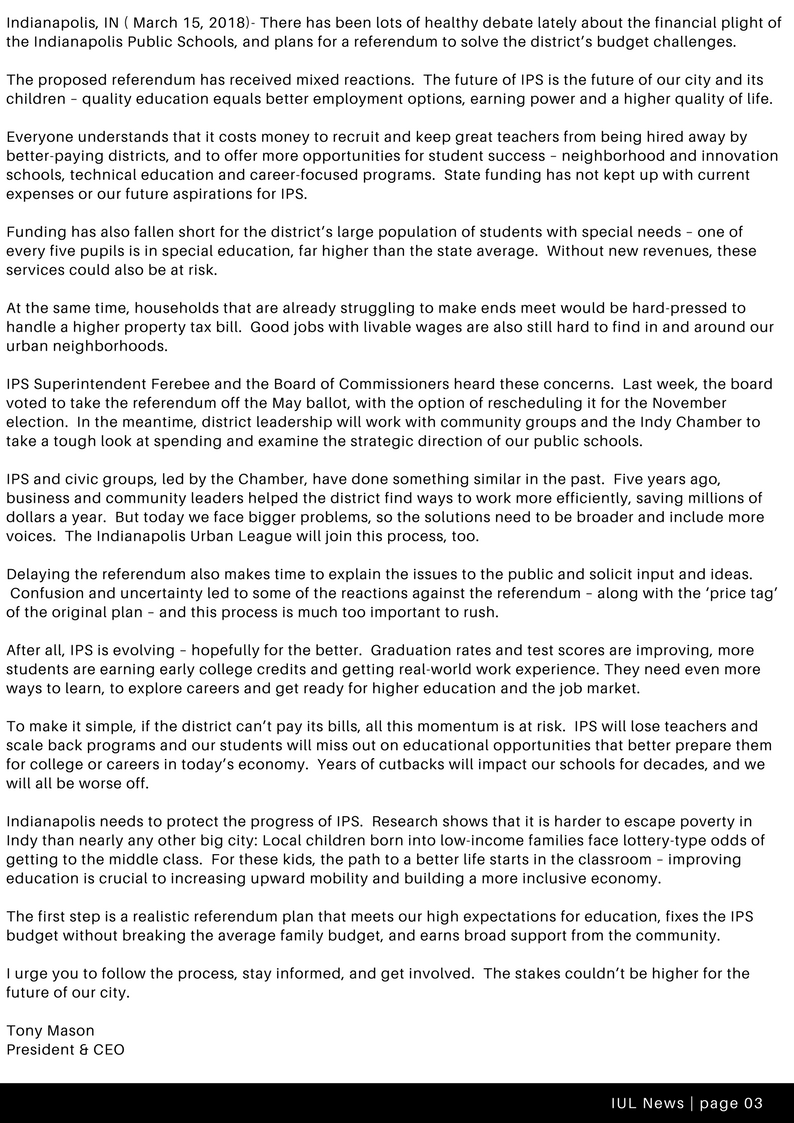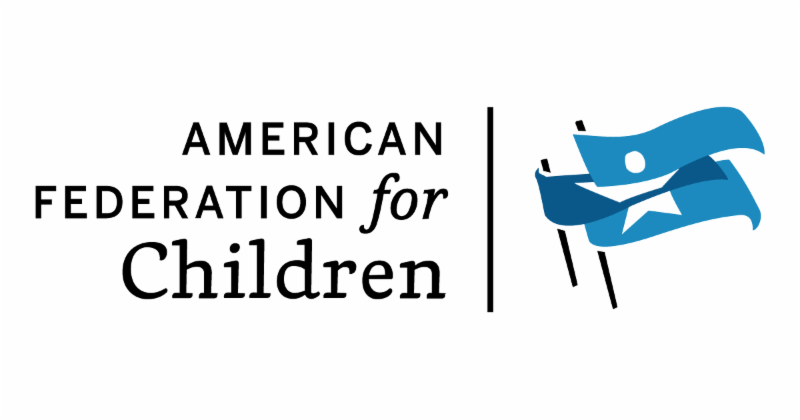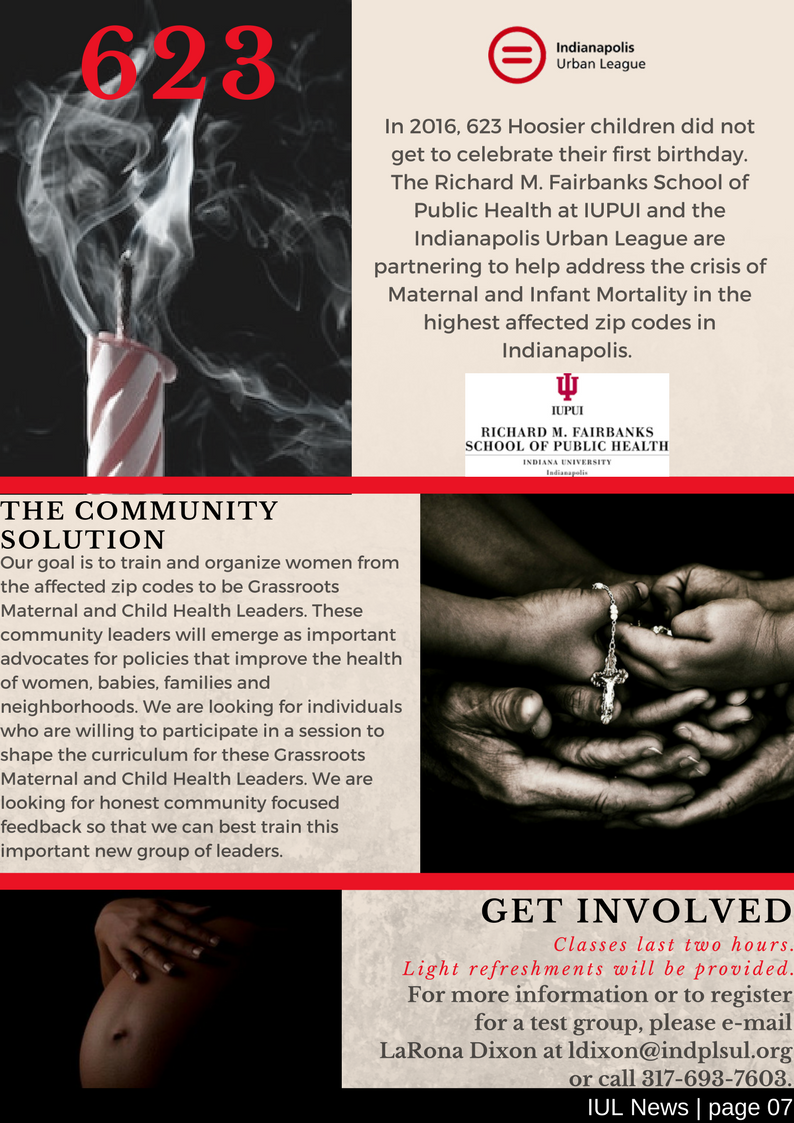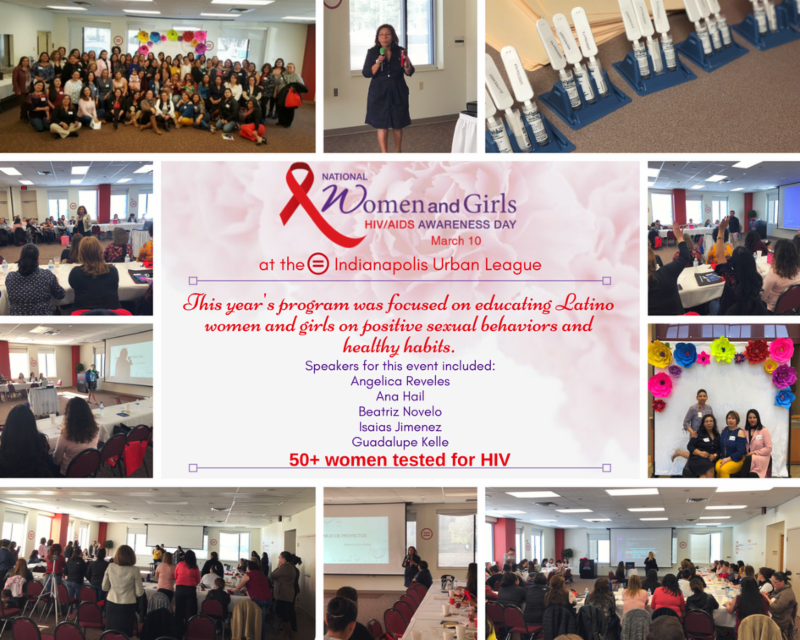The Indianapolis Urban League Statement on the State and County ISTEP Testing Data for 2018 and Persistent Achievement Gaps for Black, English Language Learners, Hispanic/Latino Students and Poor Students
(October 11, 2018)
The Indianapolis Urban League (IUL) has long-focused its commitment to advocating for and achieving equality in the areas of education and employment; as both areas are inextricably bound together.
In education we have led efforts to insure state accountability regarding implementation of the federal civil rights law for education known as the Every Student Succeeds Act (ESSA). We have raised and rallied public awareness under our work with the National Urban League’s Equity and Excellence (EEP) Project focused on achieving equity and receiving resources to insure equity at the state and local level. One of EEP’s major aspects is monitoring and shaping public policy in regard to education.
In the economic realm, we have worked tirelessly to diversify our Workforce Development program to service more clients and address their challenges more holistically by becoming a certified Center for Working Families and expanding workforce training programs helping the city achieve its ambitious goals, championed by Mayor Hogsett through his Indy Achieves initiative, as the Indianapolis Star reported earlier this year, “. . .aims to get more Marion County residents trained in the high-wage, high-demand jobs that the city currently struggles to fill, and targets 95,000 residents over the next five years through scholarships, grants and support services designed to increase college completion rates.” We also are highly supportive of the work of Ascend Indiana whose aspirational mission statement emphasizes, “Every Indiana employer will have access to the skilled workforce necessary to thrive, and every Indiana citizen will have the opportunity to pursue a meaningful career path.
The educational, economic, and public policy efforts of the Indianapolis Urban League all intersect in the issue of student achievement and readiness for college, life, and work. The readiness of students to engage in meaningful life pursuits after high school is tied directly to their school performance and is in large part measured by their performance on standardized tests such as ISTEP.
Based on our preliminary review of recently released ISTEP testing data for the State of Indiana and Marion County, the Indianapolis Urban League is duty–bound to express its great level of concern and disappointment at the stubbornly persistent achievement gaps being experienced by Black, Latino/Hispanic, English Language Learners, and Free and Reduced Lunch Student Groups in comparison to their White Student peers occurring at some of central Indiana’s most highly regarded school districts with significant numbers of these student subgroups. This phenomena is particularly disturbing as it also occurs in the context of primarily diminished student performance, as measured by ISTEP Scores, from 2016-2018.
In years past, much media and public attention has focused on IPS and their achievement gaps in spite of the fact that less than a third of Black students in Marion County attend IPS schools. The current achievement gaps for these student subgroups of learners for IPS are relatively low compared to the township schools. Even so, just 5.3% of IPS students passed both the English and Math on the 10th grade ISTEP.
Statewide, only 25% of Black students in grades 3 through 8 passed both English and Math compared to almost 58% of White students who passed both exams.
The disparities highlighted by this data point to inequities and insufficient attention to the progress of Black, Free and Reduced Lunch Student Groups, Hispanic/Latino students, English Language Learners, and Free and Reduced Lunch Student Groups attending our township schools.
The disparities we outline here are not solely the concern of these student sub-groups and their families, these achievement gaps highlight profound impediments to equity that negatively impact all Marion County residents, businesses, communities and families. Our county cannot make collective progress if so many of our students are left behind.
As the IBJ reported in June of this year, “Race and the economy are intertwined. Black Americans have substantially lower rates of upward mobility than whites, according to new Stanford University research, leading to income disparities that ability differences do not explain. Even black boys who grow up in the same neighborhood as white boys have lower incomes in adulthood in 99 percent of U.S. Census tracts. In Indianapolis, the white unemployment rate is 10 percentage points lower than the black unemployment rate of 16.3 percent, according to 2016 U.S. Census statistics, even though the labor force participation rate of the two groups is the same.”
According to US Census Bureau, American Community Survey, 2017 Estimates for Marion County, Indiana, Black unemployment in Marion County was 10.9 percent and 44,100 Black persons between the ages of 16-64 were not in the workforce. This compares to a 3.4 percent rate of unemployment for Marion County as of May 2017 according to the federal Bureau of Labor statistics.
Our concerns mirror those expressed by Brian Payne of the Central Indiana Community Foundation (CICF) in this same IBJ article which notes the CICF is “. . . undergoing a transformation aimed at narrowing the growing gulf between the community’s affluent and poor” and tackling racism and its effects in Indianapolis head-on.
For purposes of this statement, IUL is only highlighting a few school districts to give an example of the breadth of this problem county-wide.
ISTEP TESTING DATA REVEALS THE FOLLOWING DISTURBING FACTS:
Marion County Testing Gaps Grades 3 through 8
In Lawrence Township, 25% of Black students passed both ISTEP Tests in English and Math compared to 65% of whites-an achievement gap of 40% for Black students compared to their White Peers. For other student sub-groups compared to their White peers, English speaking peers, and paid lunch peers the achievement gaps were: 37.5% for Hispanic/Latino students, 30.8% for English Language Learners, and 35% for Free and Reduced Lunch Student Groups.
In Perry Township, only 27% of Black students passed both English and Math ISTEP tests compared to 58.6% of their White peers-an achievement gap of 31.6%. For other student sub-groups compared to their White peers, the achievement gaps were: 33.6% (a gap of 25%) for Hispanic/Latino students, 44.7 % of Free and Reduced Lunch Student Groups passed both exams but still had an achievement gap of 25.2% compared to their paid lunch peers.
In School Town of Speedway, 44.3 % of Black students passed both English and Math ISTEP exams compared to nearly 76% of their White peers—a gap of 31.6%. For other student sub-groups compared to their White peers and English speaking peers, the achievement gaps were: 54.5% of Hispanic/Latino students passed both English and Math ISTEP tests compared to 75.9% of their non-Hispanic/Latino peers—a gap of 21.4%. 35.8% of English Language Learners, passed both exams, compared to 67.2% of their English Speaking peers–a gap of 31.4%.
In Washington Township only 25% of Black students passed both English and Math ISTEP tests while 73.8% of White students passed both exams—an achievement gap of 48%. For other student sub-groups compared to their White peers, English speaking peers, and paid lunch peers the achievement gaps found only 27.2% of Hispanic/Latino students passed both exams—a gap of 46.6%, 13% of English Language learners passed both exams an achievement gap of 32.7 compared to their English speaking peers’ passing rate of 45.7%. Finally, 26.9% of Free and Reduced Lunch Student Groups passed both exams compared to 66.4% of their paid lunch peers – an achievement gap of 39.5%.
For the Indianapolis Urban League (IUL) these disparities in scores, opportunities, and accomplishments represent a dire threat to forward progress and equality for far too many Marion County students, families, and communities.
“We would like the community to seize this opportunity for collective action and leadership from all Marion County school districts, the Indiana General Assembly, the Indiana Board of Education, The Indianapolis State Teacher’s Association, the Mayor of Indianapolis, the Governor, and the Indianapolis area Chambers of Commerce to suggest remedies and resources to aid and strengthen existing local and state initiatives focused on educational achievement and excellence that lead to self-sufficient and upwardly mobile workers and families,” states Tony Mason, President & CEO, Indianapolis Urban League.
Anthony “Tony” Mason, President & CEO, Indianapolis Urban League





